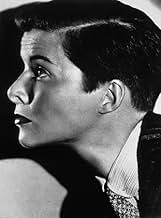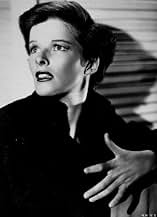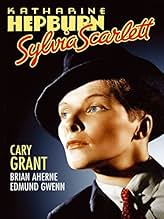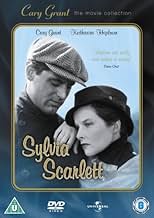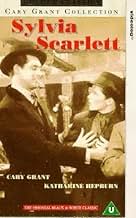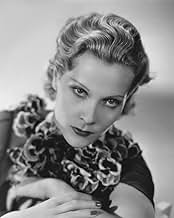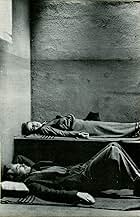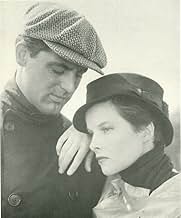CALIFICACIÓN DE IMDb
6.2/10
4.8 k
TU CALIFICACIÓN
Agrega una trama en tu idiomaWhen her father decides to flee to England, young Sylvia Scarlett must become Sylvester Scarlett and protect her father every step of the way, with the questionable help of plenty others.When her father decides to flee to England, young Sylvia Scarlett must become Sylvester Scarlett and protect her father every step of the way, with the questionable help of plenty others.When her father decides to flee to England, young Sylvia Scarlett must become Sylvester Scarlett and protect her father every step of the way, with the questionable help of plenty others.
- Dirección
- Guionistas
- Elenco
- Premios
- 1 premio ganado en total
Robert Adair
- Turnkey
- (sin créditos)
Bunny Beatty
- Maid
- (sin créditos)
May Beatty
- Older Woman on Ship
- (sin créditos)
Daisy Belmore
- Fat Woman on Beach
- (sin créditos)
Carmen Beretta
- Woman
- (sin créditos)
Nina Borget
- Minor Role
- (sin créditos)
Thomas Braidon
- Minor Role
- (sin créditos)
Elsa Buchanan
- Minor Role
- (sin créditos)
Colin Campbell
- Minor Role
- (sin créditos)
James Carlisle
- Park Scam Onlooker
- (sin créditos)
Patricia Caron
- Minor Role
- (sin créditos)
Harold Cheevers
- Bobby
- (sin créditos)
E.E. Clive
- Customs Inspector
- (sin créditos)
Edward Cooper
- Customs Inspector
- (sin créditos)
Opiniones destacadas
Androgeny is a quality that some of the biggest of our great stars possessed: Garbo, Dietrich, Grant, Vanessa Redgrave, to name a few, and of course, Katharine Hepburn. In "Sylvia Scarlett," she plays a young woman masquerading as a young man for part of this rather strange film that can't make up its mind what it is. The movie also stars Cary Grant, Edmund Gwenn and Brian Aherne. Gwenn is Henry Scarlett, an embezzler who has to high-tail it out of England fast. When his daughter Sylvia insists on going along, he tells her everyone will be looking for him with his daughter, so Sylvia becomes Sylvester by cutting his hair and donning mens' clothes.
On the boat, the two meet Jimmy Monckley, a con man, and eventually team up with him for a series of cons. Then a flirtatious maid friend of Jimmy's joins them and they become vaudevillians in one of the film's more bizarre twists. Henry, a widower, marries said maid and winds up obsessive and jealous (with, one suspects, good reason since she makes a pass at Sylvia as Sylvester). One night at a performance, the cast meets an artist, Michael Fane, whom Sylvia falls for, and she ultimately reveals himself to him as a woman.
The plot of this film changes more than the sexes, with Hepburn inexplicably staying a boy once she and her father have made their escape to France. There are some great scenes - the con in the French park, with Sylvia pretending to be a destitute boy who can't speak English, and the scene where the dress she stole on the beach so she could make her big reveal to Michael is recognized by the owner. Also, the act they perform is amusing. It probably would have been better to stick with the con angle and have the script go from there, but it goes from that to the performance angle to a love triangle etc.
Katharine Hepburn makes both an excellent boy and young woman in the throes of first love, and Cary Grant has an early, uncharacteristic role as an absolute thief and heel who is also somewhat abusive. His persona would change, and he would find it difficult to convince anyone later on to let him go back to this type of character who is not redeemed at the end. But his good looks and charm make him a natural rogue. The underrated Brian Aherne, who it appears wound up taking a back seat to Errol Flynn, is marvelous as Michael. He's romantic, sexy, and gives the role a light touch.
Directed by George Cukor, "Sulvia Scarlett" is a dizzy film that's not a wild comedy (which it probably should have been) or a drama or a love story. It's remembered today for Hepburn's cross-dressing. A shame, because it could have been remembered for more than that.
On the boat, the two meet Jimmy Monckley, a con man, and eventually team up with him for a series of cons. Then a flirtatious maid friend of Jimmy's joins them and they become vaudevillians in one of the film's more bizarre twists. Henry, a widower, marries said maid and winds up obsessive and jealous (with, one suspects, good reason since she makes a pass at Sylvia as Sylvester). One night at a performance, the cast meets an artist, Michael Fane, whom Sylvia falls for, and she ultimately reveals himself to him as a woman.
The plot of this film changes more than the sexes, with Hepburn inexplicably staying a boy once she and her father have made their escape to France. There are some great scenes - the con in the French park, with Sylvia pretending to be a destitute boy who can't speak English, and the scene where the dress she stole on the beach so she could make her big reveal to Michael is recognized by the owner. Also, the act they perform is amusing. It probably would have been better to stick with the con angle and have the script go from there, but it goes from that to the performance angle to a love triangle etc.
Katharine Hepburn makes both an excellent boy and young woman in the throes of first love, and Cary Grant has an early, uncharacteristic role as an absolute thief and heel who is also somewhat abusive. His persona would change, and he would find it difficult to convince anyone later on to let him go back to this type of character who is not redeemed at the end. But his good looks and charm make him a natural rogue. The underrated Brian Aherne, who it appears wound up taking a back seat to Errol Flynn, is marvelous as Michael. He's romantic, sexy, and gives the role a light touch.
Directed by George Cukor, "Sulvia Scarlett" is a dizzy film that's not a wild comedy (which it probably should have been) or a drama or a love story. It's remembered today for Hepburn's cross-dressing. A shame, because it could have been remembered for more than that.
Not a great movie, or even a very successful one in conventional terms, but quite fascinating to watch. A lot of people are put off by the semi-deliberate artificiality of the acting and the fanciful nature of the story, at least up to the moment where Hepburn reveals herself as a woman to Aherne.
But I think this is the point. Cukor (and Hepburn) were striving for something a bit like A Midsummer Night's Dream (which Hollywood was filming around the same time). A bunch of con-artist misfits meet up and then find a spot for themselves as a sort of traveling commedia dell-arte stage act. They fetch up in an artists' colony in Cornwall, where they are presumably more accepted than elsewhere. A kind of 1930s Forest of Arden.
There, Sylvia's masquerade is not scandalous but amusing. And just as there's actual enchantment in Shakespeare's play, the manner in which Hepburn is revealed as a woman to Aherne (an artist, of course) suggests that on some level she wasn't just masquerading. She literally is transformed back from a boy to a girl, who has to be taught once again what a girl (they never say woman in the movie) behaves like. Instead of appearing threatening to conventional notions of gender, the film underlines Sylvia/Sylvester's vulnerability and innocence.
The gay angle is clear: The theater, and the world of artists, is where Hepburn and her companions (impecunious, emotionally unstable father; odd, flighty servant girl; amoral con artist) are accepted and not judged, where her masquerade isn't a crime but an artistic achievement. Sylvia Scarlett is an effort to make American audiences embrace and find the charm in ways of life it officially rejected.
The whole concept is pretty stagy, but of course Cukor and Hepburn both came from the theater.
But while it all must have looked doable good on paper, it doesn't really work on screen. The script undermines it, for one thing: the plot is full of holes and soon after the big scene with Aherne, the enchantment and strangeness start to drain out of the story, which turns into conventional girl-meets-boy. The only remaining question is whether Kate will find up with Cary or Brian, and that just doesn't hold much interest.
One reason for this is Cukor. He was a fine director of actors, and with a good script he could make a marvelous picture. But he wasn't a great visual artist, like Ford or Welles or Hawks, who could often take mediocre writing and make it sing on screen. This is the highest-concept film he ever made, except possibly Justine late in his career, and he doesn't really have the knack for it. The broad playing and semi-Shakespearean humor never really work the way they should, and Cukor can't seem to make Sylvia's father, the darker character in the whole thing, mesh with the rest.
I wonder if the story wouldn't have been more at home in the silent cinema, where there was more latitude for enchantment and masquerade and make-believe? How would FW Murnau (Sunrise) have handled this material, for example? Hepburn herself is at her best and most entertaining in her scenes as Sylvester. She's acrobatic and rambunctious and fun to watch. The other characters treat her as a sort of adorable boy, kind of like Cherubino in The Marriage of Figaro. Very much in keeping with the deliberately theatrical atmosphere the movie tries for. Once Hepburn puts on a dress again, however, she tends to subside into that familiar Hepburn wonderfulness that can be annoying in some of her other films. The rest of the cast is just fine.
Could this have been a better movie? David Thomson suggests that another director and star (Hawks and Stanwyck, perhaps) could have made it work. Perhaps - but it would have been more conventional. I doubt that anyone else would have opted for the enchanted-forest, Midsummer Night's Dream approach that makes it so interesting. Again, I think it would have had a better chance in the silent era.
Too bad, however, that someone didn't try again!
But I think this is the point. Cukor (and Hepburn) were striving for something a bit like A Midsummer Night's Dream (which Hollywood was filming around the same time). A bunch of con-artist misfits meet up and then find a spot for themselves as a sort of traveling commedia dell-arte stage act. They fetch up in an artists' colony in Cornwall, where they are presumably more accepted than elsewhere. A kind of 1930s Forest of Arden.
There, Sylvia's masquerade is not scandalous but amusing. And just as there's actual enchantment in Shakespeare's play, the manner in which Hepburn is revealed as a woman to Aherne (an artist, of course) suggests that on some level she wasn't just masquerading. She literally is transformed back from a boy to a girl, who has to be taught once again what a girl (they never say woman in the movie) behaves like. Instead of appearing threatening to conventional notions of gender, the film underlines Sylvia/Sylvester's vulnerability and innocence.
The gay angle is clear: The theater, and the world of artists, is where Hepburn and her companions (impecunious, emotionally unstable father; odd, flighty servant girl; amoral con artist) are accepted and not judged, where her masquerade isn't a crime but an artistic achievement. Sylvia Scarlett is an effort to make American audiences embrace and find the charm in ways of life it officially rejected.
The whole concept is pretty stagy, but of course Cukor and Hepburn both came from the theater.
But while it all must have looked doable good on paper, it doesn't really work on screen. The script undermines it, for one thing: the plot is full of holes and soon after the big scene with Aherne, the enchantment and strangeness start to drain out of the story, which turns into conventional girl-meets-boy. The only remaining question is whether Kate will find up with Cary or Brian, and that just doesn't hold much interest.
One reason for this is Cukor. He was a fine director of actors, and with a good script he could make a marvelous picture. But he wasn't a great visual artist, like Ford or Welles or Hawks, who could often take mediocre writing and make it sing on screen. This is the highest-concept film he ever made, except possibly Justine late in his career, and he doesn't really have the knack for it. The broad playing and semi-Shakespearean humor never really work the way they should, and Cukor can't seem to make Sylvia's father, the darker character in the whole thing, mesh with the rest.
I wonder if the story wouldn't have been more at home in the silent cinema, where there was more latitude for enchantment and masquerade and make-believe? How would FW Murnau (Sunrise) have handled this material, for example? Hepburn herself is at her best and most entertaining in her scenes as Sylvester. She's acrobatic and rambunctious and fun to watch. The other characters treat her as a sort of adorable boy, kind of like Cherubino in The Marriage of Figaro. Very much in keeping with the deliberately theatrical atmosphere the movie tries for. Once Hepburn puts on a dress again, however, she tends to subside into that familiar Hepburn wonderfulness that can be annoying in some of her other films. The rest of the cast is just fine.
Could this have been a better movie? David Thomson suggests that another director and star (Hawks and Stanwyck, perhaps) could have made it work. Perhaps - but it would have been more conventional. I doubt that anyone else would have opted for the enchanted-forest, Midsummer Night's Dream approach that makes it so interesting. Again, I think it would have had a better chance in the silent era.
Too bad, however, that someone didn't try again!
"Odd" doesn't begin to describe what transpires in this movie. It's all like someone's dream, with unconnected events moving in and out of each other - tied together with the loosest of threads - with no real meaning. The only real reason to watch this movie is to see Hepburn and Grant before they were really big.
Unfortunately, there is absolutely no chemistry at all between any of the characters. Grant is handed a terribly drawn character and gets no real room to develop a relationship with the audience - or anyone else. Hepburn is just screechingly annoying. The rest of the cast isn't too much better, but I don't blame them. It's a terrible, terrible screenplay and is not an enjoyable time to sit through.
That's another thing. I wouldn't really have minded all the bad elements of the movie if I had a good time watching it. If not a few good laughs, at least Grant/Hepburn is usually worth some interest because of their ability to bring out the best in each other. No such luck here.
Unfortunately, there is absolutely no chemistry at all between any of the characters. Grant is handed a terribly drawn character and gets no real room to develop a relationship with the audience - or anyone else. Hepburn is just screechingly annoying. The rest of the cast isn't too much better, but I don't blame them. It's a terrible, terrible screenplay and is not an enjoyable time to sit through.
That's another thing. I wouldn't really have minded all the bad elements of the movie if I had a good time watching it. If not a few good laughs, at least Grant/Hepburn is usually worth some interest because of their ability to bring out the best in each other. No such luck here.
You can't really love this picture, to be honest, though I really do want to love anything with Hepburn. In fact, this was the first time I ever caught myself thinking she'd put in a second-rate performance, but that's arguable - some will say that her boyishness actually was well done, and I can't entirely disagree with that.
The truth is that this movie is bursting with melodramatic affectation, and that is rather off-putting to us who are so used to the post-Brando state of character representation. We have to believe that the actor IS the character for the whole thing (writing, characterization, acting, everything) to be a success. If we are embarrassed by what we perceive as a bad performance, the whole thing's in danger of being embarrassing. Now I am no expert on 30s cinema, but I have seen a lot of this kind of thing originating from that decade and I kind of reckon it was the expected style of performance, still left-over from the silent days when body language was all a performer had. Knowing what Hepburn would be capable of bringing later, I think it can't be that she relied on the melodrama like a crutch - instead it's my feeling that she was too easily by Cukor's direction, since many of the other cast members act similarly.
The script is also weak, as it relies on the audience using their imagination far too much in order to fill in the gaps we assume exist in the novel. A good writer/director team will indicate passage of time more fluidly than this; we are left with a lurching sensation, like weeks or months have passed for the characters but not for us, and some might even be confused by the sudden shift of action. If it hadn't been for this clumsiness, I would have given the picture another star for scope.
The film gets the five stars I gave it for Cary Grant's performance, which is one of the best of his career, a superb, well rounded job, and of course it is good enough to deserve a recommendation for the film, even if everything else about it was not-so-good.
The truth is that this movie is bursting with melodramatic affectation, and that is rather off-putting to us who are so used to the post-Brando state of character representation. We have to believe that the actor IS the character for the whole thing (writing, characterization, acting, everything) to be a success. If we are embarrassed by what we perceive as a bad performance, the whole thing's in danger of being embarrassing. Now I am no expert on 30s cinema, but I have seen a lot of this kind of thing originating from that decade and I kind of reckon it was the expected style of performance, still left-over from the silent days when body language was all a performer had. Knowing what Hepburn would be capable of bringing later, I think it can't be that she relied on the melodrama like a crutch - instead it's my feeling that she was too easily by Cukor's direction, since many of the other cast members act similarly.
The script is also weak, as it relies on the audience using their imagination far too much in order to fill in the gaps we assume exist in the novel. A good writer/director team will indicate passage of time more fluidly than this; we are left with a lurching sensation, like weeks or months have passed for the characters but not for us, and some might even be confused by the sudden shift of action. If it hadn't been for this clumsiness, I would have given the picture another star for scope.
The film gets the five stars I gave it for Cary Grant's performance, which is one of the best of his career, a superb, well rounded job, and of course it is good enough to deserve a recommendation for the film, even if everything else about it was not-so-good.
"Sylvia Scarlett" is like a screwball comedy that can't commit to being a screwball comedy.
Hepburn spends much of the first part of the film disguised as a boy so that she and her father (Edmund Gwenn), who are on the lam because of Gwenn's gambling debts, will be less conspicuous. They meet up with a Cockney shyster played by Cary Grant, who falls for Hepburn once he realizes she's actually a girl. Brian Aherne, playing a handsome gentleman the three come across during their travels, falls for her too. The finale involves a zany chase in which Hepburn and Aherne take off after Grant and Aherne's girlfriend in an attempt to get them back, only to discover once they've set off that they really like each other and don't much care about finding the disloyal lovers.
The fact that the film takes on gender issues at ALL makes it a curio worthy of interest, but just WHAT the film wants to do with those gender issues is never clear. Hepburn plays the character like a tomboy who's uncomfortable in her feminine skin, which is completely at odds with the girly girl she portrays in the film's very first scene. The film is never especially funny, but its overall tone is too lighthearted for the dramatic moments to make much of an impact. The editing is ragged and jumpy, which makes me wonder if the studio did some injudicious hacking, leaving elements that that would have made the film make more sense on the cutting room floor.
Critics and audiences have largely dismissed this film with an indifferent shrug, and I can't say that I blame them.
Grade: C
Hepburn spends much of the first part of the film disguised as a boy so that she and her father (Edmund Gwenn), who are on the lam because of Gwenn's gambling debts, will be less conspicuous. They meet up with a Cockney shyster played by Cary Grant, who falls for Hepburn once he realizes she's actually a girl. Brian Aherne, playing a handsome gentleman the three come across during their travels, falls for her too. The finale involves a zany chase in which Hepburn and Aherne take off after Grant and Aherne's girlfriend in an attempt to get them back, only to discover once they've set off that they really like each other and don't much care about finding the disloyal lovers.
The fact that the film takes on gender issues at ALL makes it a curio worthy of interest, but just WHAT the film wants to do with those gender issues is never clear. Hepburn plays the character like a tomboy who's uncomfortable in her feminine skin, which is completely at odds with the girly girl she portrays in the film's very first scene. The film is never especially funny, but its overall tone is too lighthearted for the dramatic moments to make much of an impact. The editing is ragged and jumpy, which makes me wonder if the studio did some injudicious hacking, leaving elements that that would have made the film make more sense on the cutting room floor.
Critics and audiences have largely dismissed this film with an indifferent shrug, and I can't say that I blame them.
Grade: C
¿Sabías que…?
- TriviaAfter a disastrous preview, director George Cukor and Katharine Hepburn went to RKO producer Pandro S. Berman's home and offered their services for free for another film. Berman, who was furious at the quality of the movie, replied tersely, "Don't bother, please."
- ErroresWhen Sylvester yells for a cop outside the mansion, Henry gets left outside. Jimmy opens the door and pulls Henry in roughly. In doing so, Henry loses a shoe. Inside the mansion, Henry has both shoes, never having retrieved his shoe from outside.
- Citas
Sylvia Scarlett: Well, we're all fools sometimes. Only you choose such awkward times.
- ConexionesFeatured in The Men Who Made the Movies: George Cukor (1973)
- Bandas sonorasHello ! Hello ! Who's your Lady Friend ?
(uncredited)
Music by Harry Fragson
Lyrics by Worton David and Bert Lee (1914)
Sung by Cary Grant and Edmund Gwenn
Selecciones populares
Inicia sesión para calificar y agrega a la lista de videos para obtener recomendaciones personalizadas
- How long is Sylvia Scarlett?Con tecnología de Alexa
Detalles
- Fecha de lanzamiento
- País de origen
- Idiomas
- También se conoce como
- En förtjusande pojke
- Locaciones de filmación
- Productora
- Ver más créditos de la compañía en IMDbPro
Taquilla
- Presupuesto
- USD 641,000 (estimado)
- Tiempo de ejecución1 hora 35 minutos
- Color
- Relación de aspecto
- 1.37 : 1
Contribuir a esta página
Sugiere una edición o agrega el contenido que falta

Principales brechas de datos
By what name was Sylvia Scarlett (1935) officially released in India in English?
Responda
